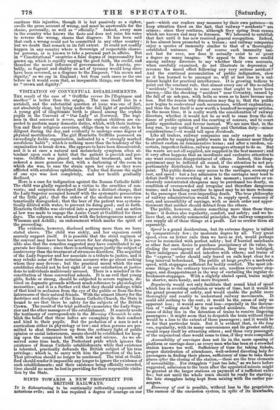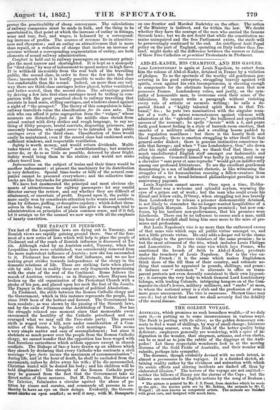HINTS TOWARDS A NEW PROSPERITY FOR BRITISH RAILWAYS. Ix is
disheartening to be continually reiterating exposures of notorious evils; and it has required a degree of courage on our part—which our readers may measure by their own patience—to keep attention fixed on the fact, that railway " accidents" are crimes ; since they continue, although they spring from causes which are known and may be foreseen. We laboured to establish that fact until it has now received general recognition. Indeed, it has almost been promoted to a truism ; and railway companies enjoy a species of immunity similar to that of a thoroughly established nuisance. But of course such immunity can- not last for ever, nor does it actually exist to so great a degree as many imagine. We appeal to the more candid among railway directors to say whether their own accounts, when carefully examined, do not illustrate in depression of revenue the moral effect following any very serious accident? And the continual accumulation of public indignation, slow as it has learned to be amongst us, will at last rise to a suf- ficient height for practical interference. It is growing tedious to point out the constant rule, that almost every one of the so-called "accidents " is traceable to some cause that ought to have been known,—like the shocking " accident " near Coventry, caused by the fall of an ash-pan, with bolts so worn as to have become use- less. But the reason why discussion may flag is, that the public now begins to understand such occurrences, without explanation ; and thus the fact itself is now.worth a hundred newspaper articles. In the mean time, it is really worth the consideration of railway directors, whether it would not be as well to cease from the de- fiance of public opinion and the courting of censure, and to court public approbation and favour instead. We are sure that, in the long run, to say nothing of humanity and Christian duty—minor considerations !—it would tell upon dividends. Like all traders, railway companies can only expect to make their profits by supplying public wants in the manner most likely to attract custom on remunerative terms ; and after a random, un- certain, imperfect fashion, railway managers attempt to do so. But the wants are not all supplied, nor supplied in the best manner ; and it very often happens that an inordinate and exclusive attention to one want occasions disappointment of others. Indeed, this disap- pointment may be inflicted all round, if the attention be not pro- portionately distributed, but be in turns exaggerated on each point. The public desires easy access to the carriages, economy of cost, and speed : but a lax admission to the carriages may tend to defeat itself by overcrowding at a late moment ; excessive or ex- clusively concentrated cheapness may be purchased too dearly, on condition of overcrowded and irregular and therefore dangerous trains; and a headlong sacrifice to speed may be no more welcome to the passenger than ever-impending death. The true philosophy of railway administration would be, to supply speed, economy of cost, and accessibility of carriage, with so much order and appor- tionment that neither should detract from the others.
The public, however, desires something more than those three items : it desires also regularity, comfort, and safety; and we be- lieve that, on strictly commercial principles, the railway companies can supply all of those things at a profit. Let us review them all separately.
Speed is a grand desideratum, but its extreme degree is valued by comparatively few; its moderate degree by all. Very great speed, even on better rails than we have as yet, would perhaps never be reconciled with perfect safety ; but if hurried merchants or other fast men desire to purchase precipitancy at its value, in- cluding the contingency of destruction, they may be indulged. Their indulgence should not interfere with others ; and trains of the " express" order should only travel on rails kept clear for a long interval beforehand. The public at large prefers a moderate speed, with stoppages sufficient for bodily comfort. The most irk- some things to the ordinary traveller are, needless irregular stop- pages, and disappointment in the way of curtailing the regular re- freshment-stoppages. With a slightly abated speed, trains might be shorter, more handy, and more frequent.
Regularity would not only facilitate that sound kind of speed which lies in avoiding confusion or waste of time, but it would be the grand promoter of safety, and would enable the public more thoroughly and readily to understand railway movements. It could add nothing to the cost ; it would be the cause of only an apparent loss ; it would save real loss—especially in the destruc- tion of "rolling stock" by the so-called accidents. One obvious cause of delay lies in the detention of trains to receive lingering passengers : it might seem that to despatch the train without them would be a loss to the extent of those passengers ; and it would be so for that particular train. But it is evident that, in the long run, regularity, with ita many conveniences and its greater safety, would repay itself by attracting others ; and those very passengers of the unpunctual class would oome to time, if they were compelled.
Accessibility of carriages does not lie in the mere opening of platform or carriage-door ; as every man who has been at a crowded station knows too well. Sufficiency of time for taking tickets, proper distribution of attendance, well-ordered directing help for passengers in finding their places, sufficiency of time to take those places after the closing of the station,—these are the true elements of accessibility. For stragglers " just too late," as we have before suggested, admission to the train after the appointed minute might be granted at the larger stations on payment of a sufficient extra fee; but not until the whole train should be ready for starting ; the late stragglers being kept from mixing with the earlier pas-, sengers.
Economy of cost is possible, without loss to the proprietors. The success of the excursion system-, in spite of its drawbacks, proves the practicability of cheap conveyance. The calculations of railway companies must be made in bulk, and the thing to be ascertained is, that point at which the increase of outlay in fittings, wear and tear, fuel, and wages, is balanced by a correspond- ing increase of profits. The sources of revenue he in attractive- ness and cheapness ; and an outlay on attractiveness that is more than repaid, or a reduction of charge that incites an increase of revenue without a corresponding augmentation of outlay, are both elements of sound railway administration. Comfort is held out to railway passengers on mercenary princi- ples the most narrow and shortsighted. It is kept as a monopoly for "first class," by way of inducement to spend money in high fares. It is withheld inexorably from the real bulk of the travelling public, the second class, in order to force the few into the first class ; insomuch that it is hardly possible to make the third class less comfortable than the second. Indeed, on more than one rail- way there are third-class carriages better glazed, better ventilated, and better seated, than the second class. The advantage gained by driving a few into first-class carriages must be trifling in com- parison with the great practical check to railway travelling that consists in hard seats, stifling carriages, and windows closed against a sight of " the prospect." The theory of this compulsion is false : railway travellers value the classification for its own sake. The rich who can afford it prize segregation from the " vulgar," whose manners are distasteful;just as the middle class shrink from actual contact with dirty clothes and rough language, to say no- thing of filthy paupers, 'brutal convicts, disgusting prisoners, and unseemly lunatics, who ought never to be intruded in the public carriages even of the third class. Classification of fares would easily be maintained, even if the second class had cushioned seats, sufficient windows, and respectable ventilation. Safety is worth money, and would return dividends. Multi- tudes travel as it is, "collision" notwithstanding; but numbers never do, or do so as little as possible, deterred by sheer fright. Safety would bring them to the station ; and would not make others travel less.
Information on the subject of trains and their times would be another inducement : at present the machinery for its distribution is very defective. Special time-books or bills of the several com- panies cannot be procured everywhere; and the collective time- books are like haystacks for pincushions. We have but enumerated the principal and moat obvious ele- ments of attractiveness for railway passengers : let any candid director survey the review, and say whether they are difficult of attainment, or uncertain of profit. Depend upon it, the public is more easily won by considerate attention to its wants and comforts, than by defiance, puffing, or deceptive cajolery ; which defeat them- selves in the long run. Let any one line give a thorough trial to administration on principles of plain common sense, and if it fail, let it arraign us for the counsel we now urge with all the emphasis of hearty conviction.



























 Previous page
Previous page